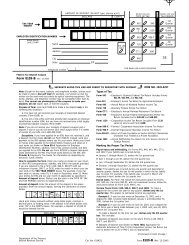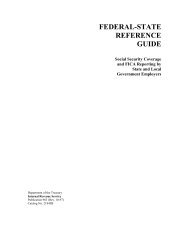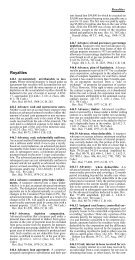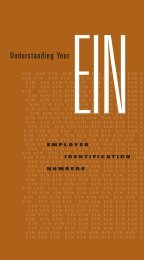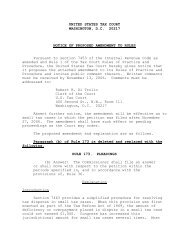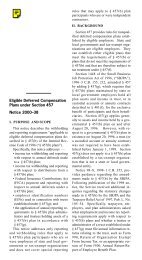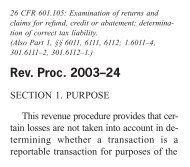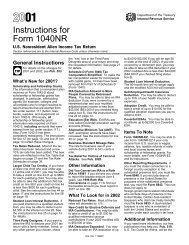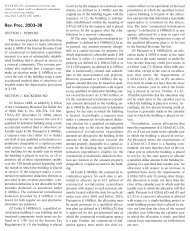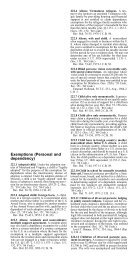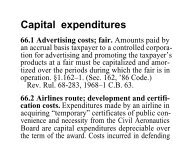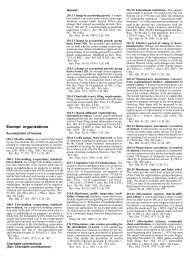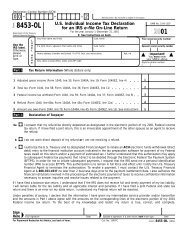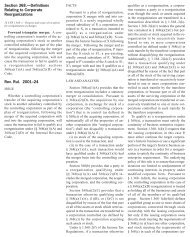Auto Dealerships - Audit Technique Guide - Uncle Fed's Tax*Board
Auto Dealerships - Audit Technique Guide - Uncle Fed's Tax*Board
Auto Dealerships - Audit Technique Guide - Uncle Fed's Tax*Board
Create successful ePaper yourself
Turn your PDF publications into a flip-book with our unique Google optimized e-Paper software.
Once the existence of a shareholder loan is established, the concern is whether the loans are<br />
arms length transactions (i.e. length of loan, interest rate, etc.). The shareholder could be<br />
receiving an interest free loan or they may be taking money out of the company tax free,<br />
through forgiveness of the loans by the corporation at a later date. Therefore, the examiner<br />
should request copies of the loan documents. If loan documents exist, they will show the<br />
terms which the examiner can then validate. If loan documents are not available, the examiner<br />
should review the corporate minutes for a possible mention of and the details of the loans.<br />
In regard to interest generated by a loan from shareholder, the examiner must inspect the<br />
payables accounts for a possible deduction of the interest owed which the shareholder which<br />
has not been paid. IRC section 267(a)(2) states the corporation and the shareholder (who<br />
hold a greater than 50 percent interest in the company either directly or by attribution) will be<br />
put on the same basis of accounting, usually cash basis, to determine when a deduction is<br />
allowed, even though one is an accrual basis taxpayer and the other is cash basis. In simpler<br />
terms, the corporation will be allowed a deduction when the interest is paid, not when it is<br />
accrued. However if the corporation has accrued the expense, inspect the Schedule M-1 to<br />
determine whether the amount has been backed out for tax purposes. To illustrate this point<br />
consider the following example:<br />
A corporate taxpayer has a tax year ending in June. The corporation accrued and<br />
deducted $125,000 as interest expense which was related to a shareholder loan. The<br />
corporation had only paid $75,000 before its yearend but paid the remaining $50,000<br />
in December. Even though the shareholder is required to include the full $125,000 in<br />
his calendar tax year, the corporation is not allowed a deduction for the accrual of<br />
$50,000 until such time as it is paid. Timing adjustments, such as this, should be<br />
considered and made.<br />
a. Demand Loans<br />
Often times, the loans between the taxpayer and its shareholder will be demand loans in<br />
lieu of formal loans with a stated rate of interest and repayment period. In the case of<br />
demand loans, special rules apply under IRC section 7872. IRC section 7872(f)(4) defines<br />
a demand loan as "any loan which is payable in full at any time on the demand of the<br />
lender" and is not necessarily "in lieu of formal loans." The foregone interest on such<br />
below-market interest rate loans is treated as transferred from the lender to the borrower<br />
as of the last day of the calendar year and retransferred immediately from the borrower to<br />
the lender as interest. There is a $10,000 de minimis exception for compensation-related<br />
and corporate-shareholder loans that do not have tax avoidance as one of the principal<br />
purposes. See IRC section 7872(c)(3).<br />
When a corporation makes interest free (or low interest) loans to its shareholders, the<br />
shareholders’ family members, or other related parties the constructive ownership rules of<br />
IRC section 267(c) apply per Treas. Reg. section 1.7872-4(d)(2)(ii).<br />
1) The shareholder has received a constructive dividend in the amount of the foregone<br />
interest to the extent of earnings and profits.<br />
B-7



